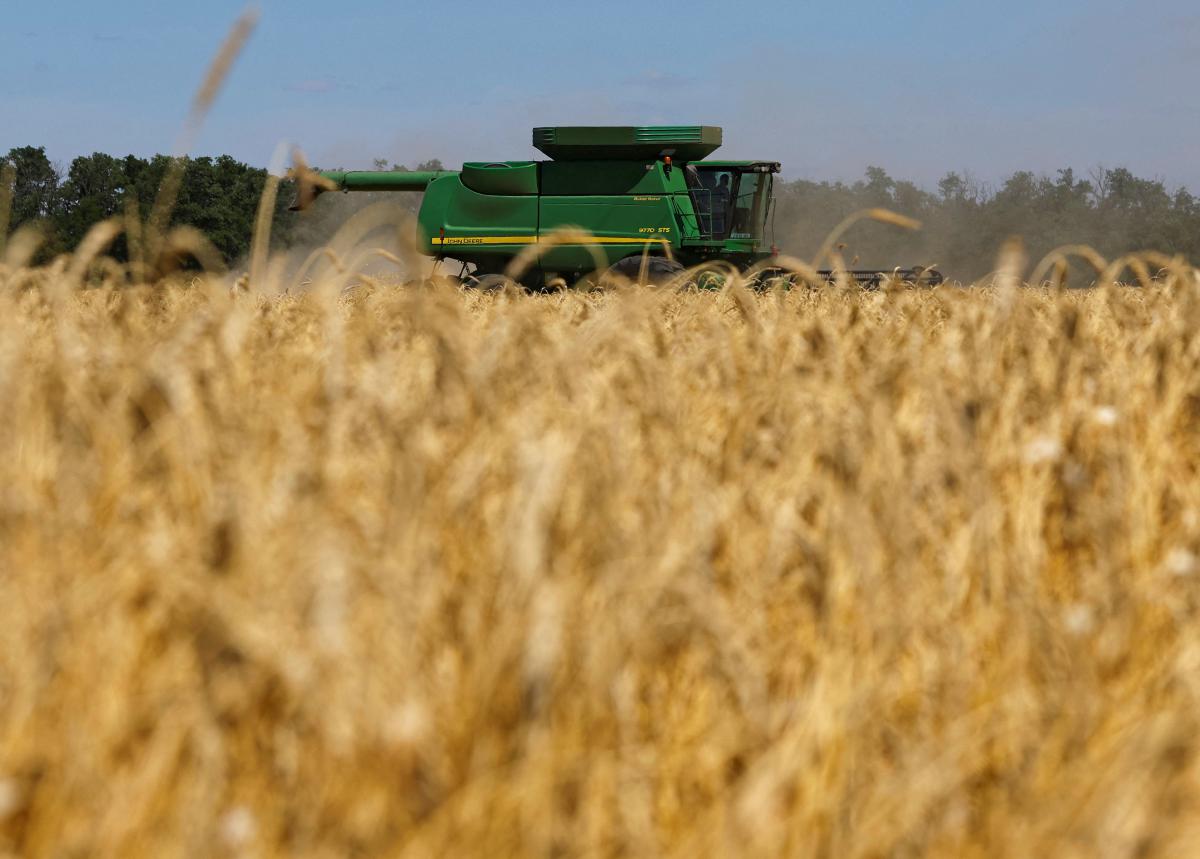
A combine harvests wheat in a field in the course of Russia-Ukraine conflict near the settlement of Nikolske in the Donetsk Region, Russian-controlled Ukraine, July 19, 2023.
12:51 JST, July 20, 2023
SINGAPORE, July 20 (Reuters) – Chicago wheat futures rose 1.6% to hit a three-week high on Thursday, buoyed by growing expectations that an attack on Ukrainian ports after Russia’s withdrawal from a Black Sea export deal will have longer-term impact on global supplies.
Corn gained more than 1%, while soybeans were little changed on forecasts of hot and dry weather in the U.S. Midwest.
“Russia’s overnight attack on infrastructures at the port of Odesa will have served to remind participants and observers as to the risks involved in maintaining Black Sea trade flows without a guarantee of safety,” BMI Research, a unit of Fitch Group, said in a note.
The most-active wheat contract on the Chicago Board of Trade (CBOT) Wv1 added 1.6% to $7.39-1/4 a bushel, as of 0203 GMT, after climbing more than 8% on Wednesday. The market hit its highest since June 27 at $7.39-3/4 a bushel.
Corn Cv1 rose 1.1% to $5.59-1/4 a bushel and soybeans Sv1 were unmoved at $14.08-3/4 a bushel.
Russia warned that from Thursday any ships sailing to Ukraine’s Black Sea ports would be seen as potentially carrying military cargoes, as Kyiv accused Moscow of carrying out “hellish” overnight strikes that damaged grain export infrastructure.
A considerable part of the grain export infrastructure at Chornomorsk port southwest of Odesa was damaged, Ukrainian Agriculture Minister Mykola Solsky said, adding that 60,000 metric tons of grain had been destroyed.
Russian President Vladimir Putin on Wednesday accused Western countries of perverting the expired Black Sea grain deal for their own ends, but said Moscow would immediately return to the agreement if all its conditions were met.
Five Central European EU members will jointly ask the EU on Wednesday to extend a ban on Ukrainian grain imports beyond a Sept. 15 deadline to avoid major market disruptions, Hungary’s farm minister told Reuters.
The collapse of a deal allowing Black Sea exports this week could lead to increased grains flows and bottlenecks in the five countries, the Central European states fear.
Top Articles in News Services
-

Survey Shows False Election Info Perceived as True
-

Hong Kong Ex-Publisher Jimmy Lai’s Sentence Raises International Outcry as China Defends It
-

Japan’s Nikkei Stock Average Touches 58,000 as Yen, Jgbs Rally on Election Fallout (UPDATE 1)
-

Japan’s Nikkei Stock Average Falls as US-Iran Tensions Unsettle Investors (UPDATE 1)
-

Trump Names Former Federal Reserve Governor Warsh as the Next Fed Chair, Replacing Powell
JN ACCESS RANKING
-

Producer Behind Pop Group XG Arrested for Cocaine Possession
-

Japan PM Takaichi’s Cabinet Resigns en Masse
-

Man Infected with Measles Reportedly Dined at Restaurant in Tokyo Station
-

Israeli Ambassador to Japan Speaks about Japan’s Role in the Reconstruction of Gaza
-

Videos Plagiarized, Reposted with False Subtitles Claiming ‘Ryukyu Belongs to China’; Anti-China False Information Also Posted in Japan























